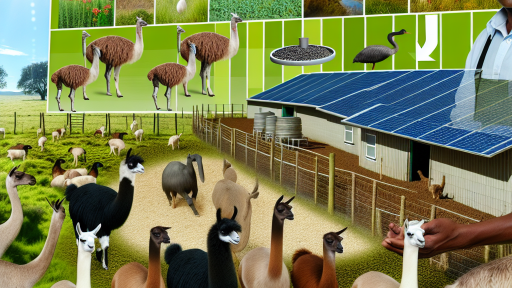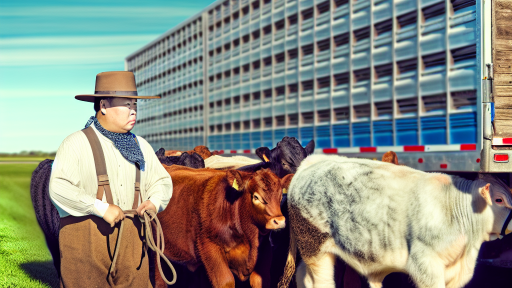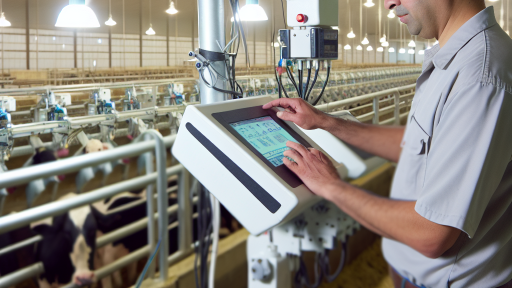Understanding Nutritional Requirements of Different Beef Cattle Breeds
Factors Affecting Nutritional Needs
Each beef cattle breed has distinct nutritional requirements.
These requirements vary based on genetics, size, and purpose.
For example, some breeds are raised for meat, while others are for milk.
Moreover, environmental conditions impact the nutrition of cattle.
Therefore, farmers should consider local climate and pasture quality.
Popular Beef Cattle Breeds
Angus is well-known for its high-quality meat production.
This breed thrives on high-energy feeds rich in protein.
Hereford cattle are another popular choice among breeders.
They require a balanced diet to maintain optimal health.
Charolais is renowned for its rapid weight gain and muscling.
This breed benefits from additional energy supplements in their diet.
Life Stage Considerations
Nutritional needs change significantly throughout a beef cattle’s life.
Calves require special diets for growth and development.
Heifers need proper nutrition for future breeding success.
Cows need adequate energy during pregnancy and lactation.
Transform Your Agribusiness
Unlock your farm's potential with expert advice tailored to your needs. Get actionable steps that drive real results.
Get StartedFinally, finishing cattle require high-energy diets for optimal weight gain.
Essential Nutrients
Beef cattle require several key nutrients for health and productivity.
Protein is crucial for muscle development and growth.
Energy is essential for maintenance, growth, and reproduction.
Vitamins and minerals support immune function and overall health.
Fibre aids digestion and promotes gut health.
Feeding Methods
Farmers can choose from various feeding methods.
Free-choice feeding allows cattle to eat based on their needs.
In contrast, total mixed ration feeding maximizes nutrient intake.
Scheduled feeding can help manage specific health issues.
Selecting the best method depends on farm management and goals.
The Importance of Macronutrients: Proteins, Carbohydrates, and Fats
Understanding Macronutrients
Macronutrients are essential for the health of beef cattle.
They provide energy, support growth, and ensure overall well-being.
Farmers must understand the role of each macronutrient.
Proteins: The Building Blocks
Proteins play a vital role in muscle development.
They are crucial for growth and tissue repair in cattle.
Sources of protein include soybean meal, alfalfa, and canola meal.
Farmers should aim for a balanced protein intake.
Inadequate protein can lead to growth stunting and low milk production.
Carbohydrates: The Energy Source
Carbohydrates serve as the primary energy source for cattle.
They are essential for maintaining body temperature and activity levels.
Common carbohydrate sources include grains such as corn and barley.
Farmers should ensure adequate carbohydrate intake during colder months.
Energy deficits can result in reduced weight gain and milk production.
Showcase Your Farming Business
Publish your professional farming services profile on our blog for a one-time fee of $200 and reach a dedicated audience of farmers and agribusiness owners.
Publish Your ProfileFats: The Concentrated Energy Source
Fats provide concentrated energy for beef cattle.
They are beneficial for weight gain and overall health.
Sources of fat include vegetable oils and animal fats.
Farmers must be cautious with fat levels in the diet.
Too much fat can lead to digestive issues and reduced feed intake.
Balancing Macronutrients
Balancing these macronutrients is crucial for optimal health.
Farmers should monitor diets regularly for adjustments.
Using nutrition supplements can help achieve balanced diets.
Consulting with a livestock nutritionist is highly recommended.
Regular feed analysis can provide necessary insights to farmers.
Micronutrients: Vitamins and Minerals Essential for Optimal Health
Importance of Micronutrients
Micronutrients play a vital role in the health of beef cattle.
These nutrients support metabolic processes and overall growth.
Specifically, they enhance immune function and reproductive efficiency.
Key Vitamins for Beef Cattle
Vitamins are crucial for various bodily functions in cattle.
Vitamin A aids vision and immune function.
Vitamin D promotes calcium absorption, essential for strong bones.
Vitamin E functions as an antioxidant, protecting cells from damage.
Sources of Vitamins
Natural grazing provides most vitamins to cattle.
Supplementation may be necessary during winter months.
Farmers should consider using fortified feeds when needed.
Essential Minerals for Optimal Health
Minerals support numerous physiological functions in cattle.
Calcium and phosphorus are crucial for bone health.
Magnesium supports muscle function and energy metabolism.
Sodium and potassium maintain proper fluid balance in the body.
Mineral Deficiency Symptoms
Deficiencies can lead to serious health issues in cattle.
For example, low calcium levels can cause milk fever.
Magnesium deficiency may lead to grass tetany.
Being aware of symptoms helps farmers address issues early.
Strategies for Ensuring Adequate Micronutrient Intake
Regular feed analysis ensures cattle receive balanced nutrition.
Incorporating a diverse forage system promotes nutrient availability.
Additionally, consider using mineral blocks or supplements.
Consulting with a livestock nutritionist can optimize feeding strategies.
Discover More: Seasonal Tips for Successful Livestock Transportation
Formulating Balanced Diets
Analyzing Forage Quality
Forage quality greatly influences cattle nutrition.
Regularly assess the nutritional value of your forage.
High-quality forage is rich in fiber and energy.
Test the forage for protein content and digestibility.
Utilize results to adjust cattle diets accordingly.
Understanding Grain Utilization
Grains provide concentrated energy and nutrients.
Consider the type of grain you use for feeding.
Showcase Your Farming Business
Publish your professional farming services profile on our blog for a one-time fee of $200 and reach a dedicated audience of farmers and agribusiness owners.
Publish Your ProfileGrains like corn and barley are commonly used.
Be mindful of potential anti-nutritional factors in grains.
Always analyze grain quality before incorporation.
Creating Balanced Diet Combinations
A balanced diet includes appropriate forage and grain mixes.
Factor in the age and weight of your cattle.
Adjust rations based on growth stages and production goals.
Avoid dramatic changes in the diet to reduce digestive issues.
Work with a livestock nutritionist for optimal results.
Monitoring Cattle Performance
Regularly monitor cattle health and performance.
Watch for signs of nutritional deficiencies or excesses.
Weight gain and milk production are key performance indicators.
Keep accurate records of feeding practices and outcomes.
Modify diets based on performance feedback.
You Might Also Like: Enhancing Herd Quality with Genetic Tools
Feeding Strategies for Different Life Stages
Nourishing Calves
Calves require special attention during their early life stages.
They need a nutrient-rich diet to support growth.
High-quality colostrum is essential right after birth.
It provides antibodies to boost immunity.
From weeks two to eight, introduce grain gradually.
Ensure they have access to good-quality hay.
Monitor their weight regularly to ensure proper growth.
Offer fresh water at all times for hydration.
Developing Heifers
Heifers need adequate nutrition for healthy development.
Balanced protein and energy levels are critical at this stage.
Provide a controlled grain ration to prevent rapid growth.
Focus on minerals and vitamins to promote strong bones.
Ensure they have access to high-quality forage.
Regularly assess body condition scores for adjustments.
This aids in preparing them for breeding in the future.
Feeding Bulls
Bulls need a diet that supports muscle development and stamina.
High-quality protein is vital during their growing phase.
Forage should be abundant to support digestive health.
Consider mineral supplementation to enhance reproductive health.
Monitor their condition to avoid obesity, which can inhibit performance.
Create a consistent feeding schedule to promote routine.
Finally, ensure access to fresh and clean water daily.
See Related Content: Health and Safety Guidelines for Livestock Handling

Evaluating Feed Quality: How to Select and Store Feed Properly
Importance of Quality Feed
Quality feed plays a crucial role in livestock health.
It influences the growth and productivity of beef cattle.
Moreover, it impacts the quality of the meat produced.
Showcase Your Farming Business
Publish your professional farming services profile on our blog for a one-time fee of $200 and reach a dedicated audience of farmers and agribusiness owners.
Publish Your ProfileRecognizing Quality Indicators
Evaluate the color, smell, and texture of the feed.
Fresh feed should have a pleasant aroma and vibrant color.
Watch for signs of mold or a dusty appearance.
These factors can indicate spoilage or low nutritional value.
Selecting the Right Feed Type
Understand the nutritional requirements of your cattle.
Different life stages require specific types of feed.
For example, calves need a high-protein diet for growth.
On the other hand, pregnant cows require a balanced diet for fetal development.
Storing Feed Properly
Store feed in a clean and dry environment.
Moisture can lead to mold growth and spoilage.
Use airtight containers to keep feed fresh and protected.
Regularly check stored feed for any signs of degradation.
Regularly Testing Feed Quality
Conduct routine tests on feed to monitor its quality.
Use laboratory services to analyze nutrient content.
Testing helps identify deficiencies or excesses in the diet.
This knowledge allows for better feed formulation.
Keeping Up with Nutrition Research
Stay informed about the latest in cattle nutrition.
Attend workshops and read relevant literature.
Connect with agricultural extension services for reliable guidance.
New research can offer insights into improved feeding practices.
Explore Further: Genetic Factors Influencing Livestock Fertility
Common Nutritional Deficiencies and How to Address Them
Understanding Nutritional Deficiencies
Nutritional deficiencies can severely impact cattle health and productivity.
It’s crucial to identify these deficiencies early.
Doing so allows for timely intervention and correction.
Common Nutritional Deficiencies
Protein Deficiency
Insufficient protein affects growth and milk production.
Cows require adequate protein for optimal performance.
Common symptoms include weight loss and decreased milk yield.
Mineral Deficiencies
Minerals are vital for various bodily functions.
Calcium, phosphorus, and magnesium are often lacking.
Mineral deficiencies can lead to serious health issues.
Vitamin Deficiencies
Vitamins play a significant role in cattle immunity.
Deficiencies in vitamins A, D, and E can occur without proper nutrition.
These deficiencies can result in poor reproduction and growth rates.
Addressing Nutritional Deficiencies
Provide Balanced Rations
Create balanced rations that meet protein and energy needs.
Consult a livestock nutritionist for tailored recommendations.
Use High-Quality Forage
Quality forage is essential for healthy cattle nutrition.
Monitor forage quality to ensure adequate nutrient intake.
Implement Supplementation
Consider mineral and vitamin supplements as necessary.
Use supplements to bridge gaps in the diet.
Regularly test feed components to determine supplementation needs.
Showcase Your Farming Business
Publish your professional farming services profile on our blog for a one-time fee of $200 and reach a dedicated audience of farmers and agribusiness owners.
Publish Your ProfileMonitoring and Evaluation
Regularly monitor cattle health and performance metrics.
Keep track of weight gain, reproduction rates, and milk production.
Periodic blood tests can highlight deficiencies early.
Adjust nutritional plans based on observed performance trends.
The Role of Water in Beef Cattle Nutrition
Importance of Water in Cattle Diets
Water is essential for the health of beef cattle.
It plays a critical role in digestion and nutrient absorption.
Cattle need water to maintain body temperature effectively.
Moreover, it supports vital physiological functions.
Inadequate water intake can lead to health problems.
For instance, dehydration can affect milk production.
Thus, ensuring a steady water supply is key to livestock health.
Daily Water Requirements
Understanding daily water requirements is vital for farmers.
The water needs of cattle vary based on several factors.
Factors include age, weight, and environmental conditions.
On average, a mature beef cow may drink between 8 to 14 gallons daily.
Heat stress conditions can increase water intake significantly.
Therefore, monitor water consumption regularly.
Water Quality Management
Water quality directly affects cattle health and productivity.
Farmers should regularly test water sources for contaminants.
Common issues include high mineral content and bacterial contamination.
Ensure that water sources are clean and free from pollutants.
Biosecurity measures can help protect water quality effectively.
Additionally, consider using water treatment solutions when necessary.
Water Supply Systems
Efficient water supply systems improve cattle hydration.
Assess the types of water troughs and drinkers available.
There are several designs for cattle water troughs.
Ensure troughs are accessible and easy to clean.
Regular maintenance prevents issues like algae growth and blockages.
Consider placing multiple water sources in larger pastures.
Seasonal Considerations
Seasonal changes affect cattle water needs significantly.
During hot months, water needs increase for hydration.
In contrast, cold weather may reduce water intake.
However, cattle still need adequate hydration in winter.
Provide unfrozen water sources to ensure continuous access.
Always adjust your management practices according to the season.
Signs of Dehydration
Recognizing signs of dehydration is crucial for prompt action.
Common signs include dry mouth and sunken eyes.
Dehydrated cattle may also display lethargy or decreased appetite.
Monitor cattle frequently, especially in extreme weather conditions.
If in doubt, consult a veterinarian for guidance.
Showcase Your Farming Business
Publish your professional farming services profile on our blog for a one-time fee of $200 and reach a dedicated audience of farmers and agribusiness owners.
Publish Your Profile



